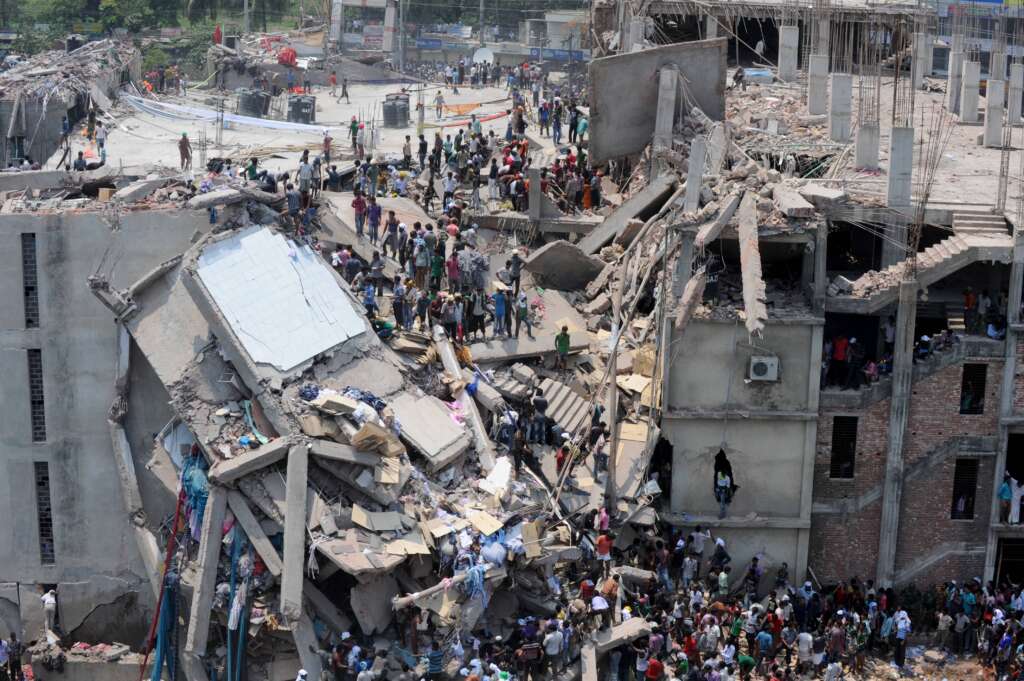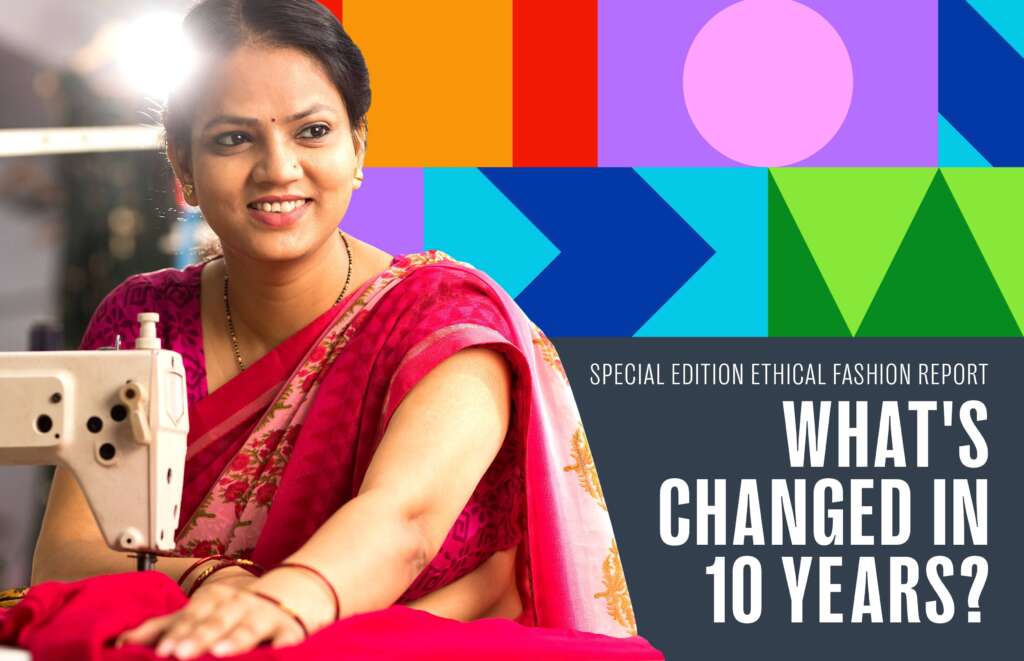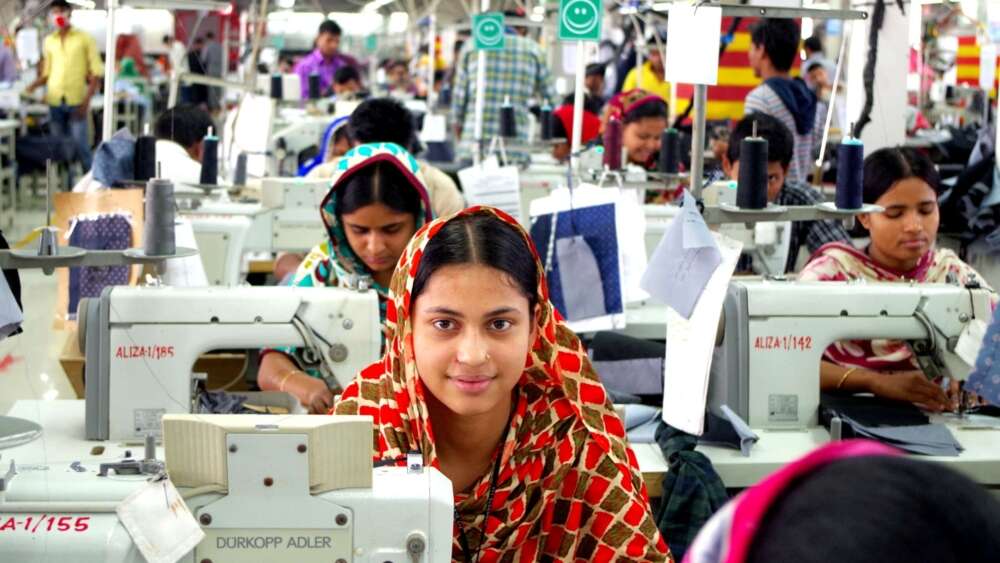In ten years, Baptist World Aid’s Advocacy team has witnessed highs and lows in the ethics of the global fashion industry. This year, we’re looking back at what’s changed – and what’s yet to.
2023 marked the tenth anniversary of Baptist World Aid’s first Ethical Fashion Report. Through ten years of advocacy, action, and holding companies to account, Baptist World Aid (BWA) – alongside countless other organisations, advocates, and individuals – has pushed fashion closer to becoming an industry that respects its workers and the planet.
What is most shocking isn’t what has changed but what hasn’t. This report shows that despite remarkable advancements in areas such as tracing, transparency and policies, outcomes for workers have failed to progress.
April 24, 2023, marks the tenth anniversary of the deadliest disaster in the global garment industry. On that day in 2013, the Rana Plaza garment factories collapsed in Bangladesh, killing more than 1100 people and injuring 2500, most of them women.

On April 24, 2013, the Rana Plaza garment factories collapsed in Bangladesh
The past decade has seen significant wins and losses for the world’s garment workers. Throughout the ups and downs, BWA’s Ethical Fashion Team have persisted in challenging some of Australia’s largest fashion companies on what they’re doing to create change.
Here are ten things we’ve learnt from ten years of ethical fashion research and advocacy.
Paper policies aren’t cutting it.
Over the past decade, one of the most extensive areas of improvement our research has uncovered is the development of company policies, such as supplier Codes of Conduct. While this is a great foundational step, it often fails to catalyse actual change in supply chains.
For example, our Special Edition Ethical Fashion Report found that in 2013, three-quarters of all companies assessed had ‘freedom of association’ listed in their code, and in 2022, this remained high. But of the entire company cohort assessed in 2022, just 5 per cent could evidence unions or collective bargaining agreements present for over three-quarters of their suppliers.
Just 5 per cent could evidence unions or collective bargaining agreements
Without such agreements, workers cannot push back against power imbalances between themselves, their factory managers, and the fashion brands they’re producing for, and ultimately create the change required to eliminate exploitation and achieve payment of living wages.
Paper policies will no longer cut it. In many countries, the people who make our clothes still live in poverty despite working 12-hour days, six days per week. Many fail to have their voices genuinely heard by fashion companies and cannot raise concerns without fear of retribution, as freedom of association, union presence, and collective bargaining agreements are still scarce
Without high-level buy-in, fashion companies struggle to move the needle.
Our researchers often work closely with fashion company employees who are passionate about doing the right thing for workers and the environment. However, without support from company executives and board members, their ability to implement more robust ethical sourcing policies and initiatives is limited. But companies with sustainability KPIs and targets set by their board and executive leadership are more likely to achieve greater, more genuine change.
Worker empowerment must be central to change.
Garment workers know better than anyone what their factory conditions are like and what changes could make a genuine difference. Their lived experience must be central to all initiatives seeking to improve their well-being; otherwise, they are likely to be uninformed at best and fail at worst.
Giving workers a collective voice – through unions or collective bargaining agreements – shifts the power imbalance away from factory management and fashion brands and towards the workers.
Supply chain tracing is the most pivotal step a company can take in their ethical sourcing journey.
Without knowing where their fibres, fabrics, and finished products are coming from, companies cannot put in place systems to protect their workers and the environment.
Surprisingly, most fashion companies are unaware of where most of their fabrics and fibres come from. This is deeply concerning, given the highest risk of modern slavery sits in these deeper tiers of the supply chain.
A lack of issues identified isn’t necessarily a good thing.
One of the giant red flags for our research team is reading reports or hearing companies say, ‘We’ve never received any reports or found any issues of worker exploitation in our supply chain.’ While this is often conveyed as a positive insinuation of ‘we’ve nothing to worry about’, it tells us that the company has failed to implement the systems and processes that adequately capture problems as they’re occurring.
 We know the fashion industry is among the highest-risk industries for worker exploitation globally. Companies must work on the assumption that there are issues in their supply chain. And they must work to uncover and remediate them as they arise. Only once this mindset is adopted can the core drivers of exploitation be addressed.
We know the fashion industry is among the highest-risk industries for worker exploitation globally. Companies must work on the assumption that there are issues in their supply chain. And they must work to uncover and remediate them as they arise. Only once this mindset is adopted can the core drivers of exploitation be addressed.
Collaboration is key.
True systemic change can only be achieved when companies, governments, NGOs, and global citizens work together. Modern slavery and living wages are complex issues, and individuals cannot achieve change alone.
Multi-stakeholder initiatives coupled with strong government policies, NGO advocacy, and ever-increasing public demand will be vital to leveraging more significant impact and long-term change.
‘Critical friendship’ is essential in advocacy.
Our theory of change hinges on building strong relationships with fashion companies. When invited into companies’ head offices to discuss ethical sourcing, we see these opportunities as privileges. As part of the system, we’re here to assist companies on their journey.
We believe we have more impact in the long-term as a ‘critical friend’ than a combative acquaintance who names and shames.
While maintaining good relationships is important, it doesn’t prevent us from having tough conversations and identifying poor practices when we see them. We believe we have more impact in the long-term as a ‘critical friend’ than a combative acquaintance who names and shames.
We can celebrate wins and still be disappointed at the lack of progress.
Celebrating progress along the journey is important, even when there’s still a way to go. Unfortunately, no silver bullet will solve the fashion industry’s myriad problems, so we’re conscious that it’s through small, incremental changes that the industry will evolve.
Celebrating the wins – no matter how ‘small’ – is essential for maintaining momentum and motivation for a long-term project.
Your voice has power.
When you share our Ethical Fashion Scorecard and tag a brand on social media or use our Speak Out To Brands tool to send an email, brands listen.
Our research shows that the 25 brands included in the Ethical Fashion Report consecutively since 2013 outperform the 2022 clothing cohort by an average of eleven points. This speaks to the value of consistent, ongoing public accountability through advocacy efforts such as the Ethical Fashion Project.
There’s still a long way to go before fashion is synonymous with ‘ethical’ and ‘sustainable.’
The industry has made progress over the past decade. But the pace of change is not fast enough for the workers who are still being exploited and the planet, which is still being degraded.
At Baptist World Aid, we see a better world where all garment workers are treated with respect and dignity, can afford to support their families and live and work in healthy and safe environments.
We celebrate the progress the fashion industry has made but call on them to act now to create genuine, systemic change over the coming decade. The Ethical Fashion Project isn’t going anywhere until we reach a world where all garment workers are treated with respect and dignity, can afford to support their families, and live and work in healthy and safe environments. We won’t stop until this is the reality. Will you help us realise it?
You can read the report here.
Bonnie Graham is an ethical fashion researcher for Baptist World Aid.
Email This Story
Why not send this to a friend?


